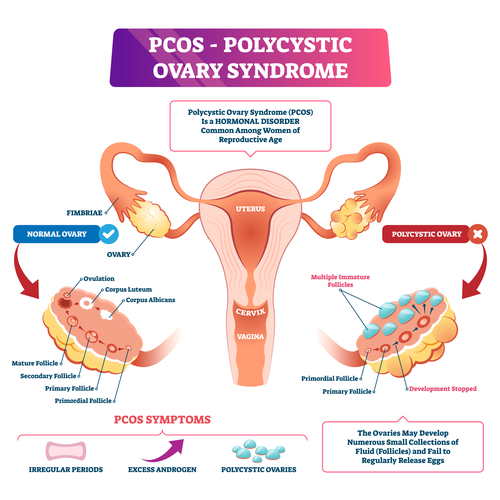PCOS is a hormonal imbalance that can lead to infertility, weight gain, irregular periods, and other symptoms. PCOS stands for Polycystic Ovary Syndrome. If you are experiencing these symptoms, a gynecologist can help determine if you have PCOS. Read on to learn more about this disorder.
What is PCOS?
Polycystic ovary syndrome (PCOS) is a common hormonal disorder. PCOS is a condition in which a woman’s ovaries produce too many male hormones. This may interfere with the ovaries’ ability to produce eggs regularly. PCOS (Polycystic Ovary Syndrome) is a leading cause of female infertility and is responsible for a number of symptoms that can affect the body physically and emotionally. PCOS affects approximately 10% of all women between the ages 18-40 in the United States.
The exact cause is unknown, but it is considered a hormonal condition that might be caused by genetic and environmental factors. Those with PCOS often have higher levels of androgen (male hormones), aren’t as responsive to insulin as their body should be, and lack progesterone which contributes to irregular periods.

Signs and Symptoms of PCOS
PCOS symptoms can start showing right after puberty, but can also develop during later teen years and early adulthood. As the syndrome is characterized by high testosterone levels in women, the hormone imbalance may cause many issues related to how the female body should normally function.
The most common symptoms include:
- Irregular or missed periods: Irregular menstrual periods may be the first sign of PCOS in girls.
- Ovarian cysts: Some women with PCOS develop cysts on their ovaries. Ovarian cysts are fluid-filled sacs that can result in pain in your abdomen or lower back, bloating, constipation and nausea.
- Infertility: Women with PCOS often have trouble getting pregnant. With the hormone imbalance, ovulation may occur irregularly or not at all.
Other symptoms and complications of PCOS may include:
- Acne
- Mood changes
- Pelvic pain
- Weight gain
- Insomnia
- Thinning of hair on the head or unwanted hair growth
- Excess facial or body hair (known as hirsutism)
- Miscarriage or premature birth
- Liver inflammation known as nonalcoholic steatohepatitis
- Sleep apnea
- Depression
- Anxiety
- Eating disorders
- Abnormal uterine bleeding
- Endometrial cancer
- Type 2 Diabetes
Women with PCOS are at an increased risk of developing type 2 diabetes because their bodies cannot produce enough insulin to regulate blood sugar levels properly. High levels of insulin can also lead to more testosterone being produced. This is one reason why women with PCOS may have more masculine features such as acne, facial hair, and body hair. In the event of pregnancy, gestational diabetes has a higher likelihood.
Not everyone with PCOS has the same signs or symptoms. Those affected may not show any signs. Often, Polycystic ovary syndrome may go undiagnosed for some time because the symptoms can be easily attributed to other factors.
Diagnosing PCOS
There is not one special test that identifies PCOS. In order for your doctor to effectively evaluate your case, your medical history and symptoms must be examined, and sometimes a number of tests may need to be taken.
If you are experiencing symptoms, a doctor can diagnose PCOS through a physical exam and medical history. This will include the history of your menstrual periods and weight, checking for signs of excess hair growth, acne, and insulin resistance.
- A pelvic ultrasound may also be performed to look for growths, abnormalities, and to verify the reproductive organs are in good health.
- Blood tests are how your doctor will measure your hormone, glucose, cholesterol, and triglyceride levels.
- Using ultrasound, your doctor can check the ovaries and measure the thickness of your uterine lining. An ultrasound will create a visual image the doctor can actually see without any kind of invasive procedure.
Treatment for Polycystic Ovary Syndrome
There is currently no cure for PCOS, but there are many ways to treat or decrease the symptoms caused by the condition. There is no one-size-fits-all treatment for PCOS, as the condition can vary from woman to woman. However, there are a few treatments that are often recommended.
- Hormonal birth control is the standard treatment for women with PCOS. Birth control pills containing estrogen and progesterone can help regulate menstrual cycles and reduce the production of male hormones. Birth control pills regulate periods and improve excess hair growth and acne. However, women that are wanting to get pregnant must seek other options.
- Progestin therapy can be done to regulate your periods and protect you against endometrial cancer. Be aware, progestin alone will not prevent pregnancy.
- Metformin is commonly prescribed to those diagnosed, which helps regulate hormone levels and can improve menstrual patterns. Metformin was originally developed to treat Type 2 Diabetes by helping the body control blood sugar.
- Clomiphene (Clomid) is a common treatment used to induce ovulation. Clomid can significantly improve the chances of pregnancy by inducing ovulation for those who do not ovulate at all or have irregular ovulation cycles.
- Lifestyle measures can be taken as well to offset specific symptoms, such as weight gain. An active lifestyle is also proven to regulate ovulation and periods.
- Diet can help regulate hormones and improve ovulation in women with PCOS. A healthy diet includes plenty of fruits, vegetables, and whole grains. It is important to limit processed foods, sugary drinks, and unhealthy fats. If you are taking Metformin, additional B12 supplements may be needed as it can cause malabsorption of the vitamin.
Schedule an OBGYN Appointment in Brentwood, TN
If you suspect you might have Polycystic Ovary Syndrom, please schedule an appointment with Dr. Lodge for testing. If left untreated, complications from PCOS could include uterine cancer or diabetes type 2 because your body cannot produce enough insulin to regulate blood sugar levels properly. Call our office at 615.690.6600 with any questions or to schedule your appointment.

